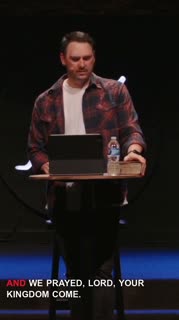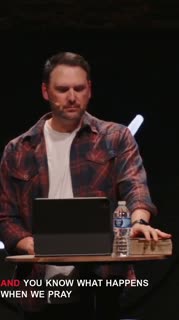Being the Church: Prayer, Community, and Action
Devotional
Sermon Summary
Bible Study Guide
Sermon Clips
We need to be reminded we've got to be the church. We're not expecting government to go do all the things the church does. It's supposed to do, are we? No, we'd be the church. And so that's what we want to talk about today. [00:38:36] (13 seconds)
And we prayed, Lord, your kingdom come. Your will be done. Your will be done on earth as it is in heaven. And I believe he gave us mercy over our nation. [00:39:06] (9 seconds)
So today, I'm not really going to get into that. I want us to talk about, okay, the election's over, so what do we do next? What is our role? You know, we're supposed to be salt and light. That's not the government's job. It's our job. [00:39:42] (14 seconds)
We don't want anybody to be lost. We don't want anybody not to know Jesus. Exactly. Yes. Then it says, Thanksgiving, bring Thanksgiving Thanksgiving to God for people, people we don't even agree with who might even persecute us and say wrong things about us. God loves them. [00:45:09] (24 seconds)
And you know what happens when we pray for people we disagree with? Here's what happens. We actually get compassion for them. It's hard to hate somebody when you're praying for them. [00:48:27] (13 seconds)
Let me just say something. I don't know if you're watching, but God is up to something in our nation. [00:49:39] (8 seconds)
We can be something, and I think we actually are, but I think we can even be even more something where people on the outside go, I don't know, sometimes I don't totally agree with it, but I look at that and I go, I want to be a part of that. They love each other. [01:15:05] (14 seconds)
The election is over. What do we do next? We be the church. We be the church. We be the church. Let me tell you, the harvest is coming. We got to get prepared. [01:15:50] (10 seconds)
Ask a question about this sermon
And we prayed, Lord, your kingdom come. Your will be done. Your will be done on earth as it is in heaven. And I believe he gave us mercy over our nation. [00:39:06] (9 seconds)
So today, I'm not really going to get into that. I want us to talk about, okay, the election's over, so what do we do next? What is our role? You know, we're supposed to be salt and light. That's not the government's job. It's our job. [00:39:42] (14 seconds)
We don't want anybody to be lost. We don't want anybody not to know Jesus. Exactly. Yes. Then it says, Thanksgiving, bring Thanksgiving Thanksgiving to God for people, people we don't even agree with who might even persecute us and say wrong things about us. God loves them. [00:45:09] (24 seconds)
And you know what happens when we pray for people we disagree with? Here's what happens. We actually get compassion for them. It's hard to hate somebody when you're praying for them. [00:48:27] (13 seconds)
Let me just say something. I don't know if you're watching, but God is up to something in our nation. [00:49:39] (8 seconds)
We can be something, and I think we actually are, but I think we can even be even more something where people on the outside go, I don't know, sometimes I don't totally agree with it, but I look at that and I go, I want to be a part of that. They love each other. [01:15:05] (14 seconds)
The election is over. What do we do next? We be the church. We be the church. We be the church. Let me tell you, the harvest is coming. We got to get prepared. [01:15:50] (10 seconds)








